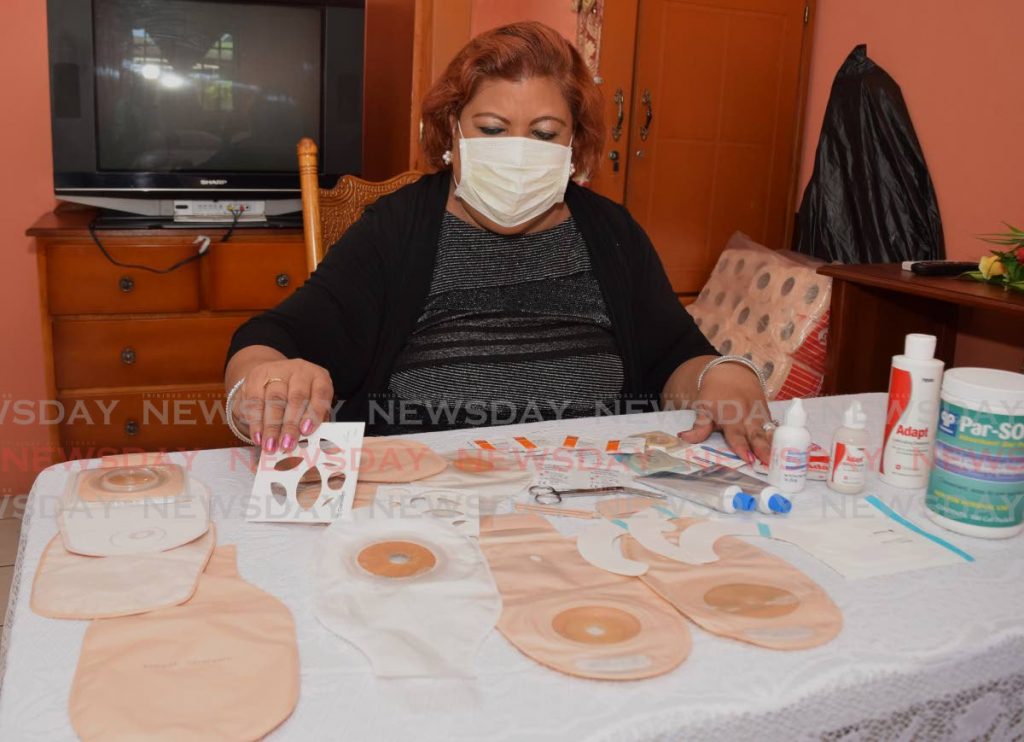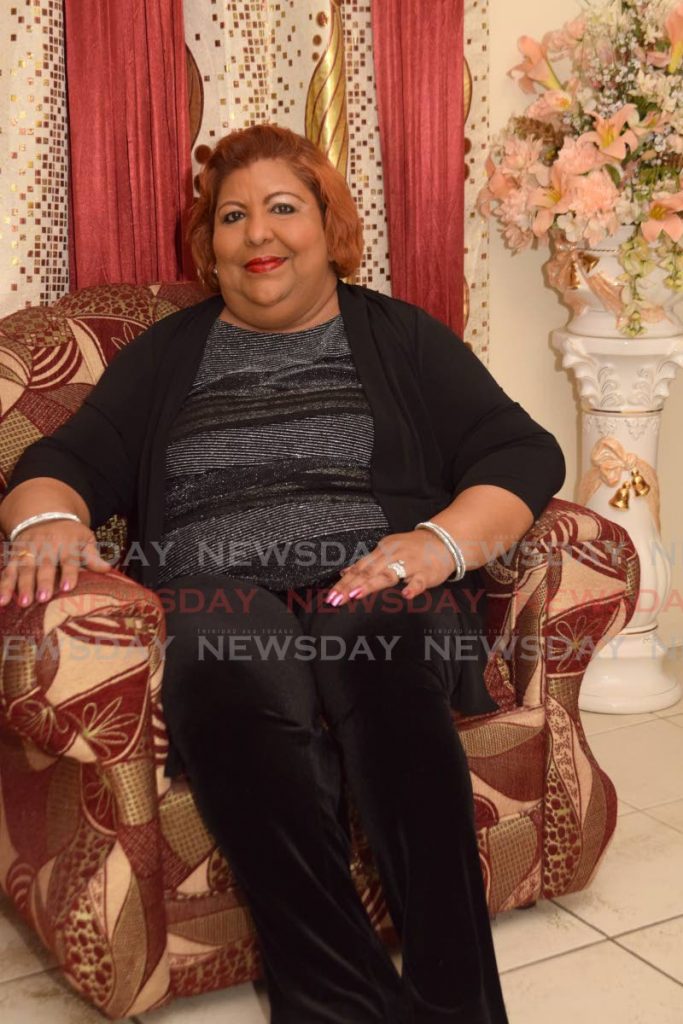Life with a pouch can be a happy one

Ostomy. It's probably not a word you've ever used. And if you've had, it probably conjured up feelings of concern, uncertainty and insecurity.
An ostomy is an artificial opening in an organ of the body, created during an operation such as a colostomy, ileostomy, or gastrostomy that results in a stoma.
In all such procedures, the waste is usually collected in a pouch worn on the outside of your body and disposed.
For most patients with cancer-related colostomy or ileostomy they only need the pouch for a few months while the intestine heals. But some people may need a permanent ostomy.
It is a procedure that approximately 4000 people in TT have had, and a condition they currently live with.
The operation, used many times as a last resort in emergency cases to save a patient's life, also affects the patient’s quality of life after the surgery. While living as an ostomate requires adjusting and altering one's life, it doesn't mean that life has to be limited.
It may seem very difficult if alone or unsupported but there is hope, in the business of Better Life Ostomy Care.
Founder and owner Charmaine Mahraj-Edwards has been in the ostomy business since 2014, and has been an ostomate for 34 years.
She had the procedure done at 21. She was hospitalised after suffering symptoms of heavy, bloody diarrhoea, drastic weight loss and weakness, and was later diagnosed with advanced ulcerative colitis.
"I had my surgery on May 28, 1986. After I had surgery, I isolated myself at home for a whole year because (I did not know) there could be life after ostomy surgery. At that time I was the second person in Trinidad to have that done."
She explained that her feelings and reactions in the first year after her surgery are common among ostomy patients.
"The thing about having an ostomy is that people may feel that this is the end of the world and they need others to do things for them and this is not it.
“You have to tell yourself, I don't want this disability to make me disabled. I used what I thought was a disability and turned it into an ability (through) which I can perform a service for other ostomates."
It would be after ten years as an ostomate, with limited information on the condition, that Mahraj-Edwards would be given a new mission.
She detailed how her new life started. "I was approached by an ostomy care nurse and a patient who had her ostomy one year before (I did) and they wanted to start an association, because at that time there were a lot more people getting (an) ostomy. After I thought about it, I agreed and we formed the Ostomy Association of TT (OATT)."
A founding member of OATT, Mahraj-Edwards also became its secretary, a position she held for 23 years, during which she visited and counselled patients.
She also started her own business.
"I left my job (as an accountant) ten years ago in 2010, to…take care of my father in the US, and for four years I wasn't here. When I came back, I couldn't get a job."

Even though she was not working Mahraj-Edwards still volunteered with OATT. It was at this point her boyfriend (now husband) and two brothers, who live abroad, encouraged her to get into the ostomy business.
She met her husband, Cleaver, when he came to her mother's home to do construction work in August 1996. The two began talking and two months later she revealed her condition to him. His support has been integral.
"He is everything, physical, emotional and spiritual support. He was the first person to accept me for me. He didn't try to make me a different person, he saw me as an equal."
Cleaver accompanied her to the first OATT meeting that year.
Mahraj-Edwards recalled how he inspired her to start a business. "He said why don't you invest in the supplies so when you go to a patient you will have stuff rather than going and talking to them and you have nothing to give them or offer them. So my husband and two brothers pushed me into starting my own business. My brothers who are tremendous supporters bought all the supplies I knew people would use, which were the better brands."
She educated herself about ostomy care products through online and practical courses with the Wound Care Educational Institute in Puerto Rico, where she qualified as an ostomy wound care nurse and stoma consultant.
With her support team in place, Mahraj-Edwards registered her business in 2014. She explained how it works. "I meet people and do their (ostomy pouch) change. I have an office in Caroni, where I also see people who are mobile and who could manage to come to the office. The ones that I go out to see are who just had surgery or who are sick and cannot come. I also do home visits." She also goes to Tobago to see about clients there.
During home visits, Mahraj-Edwards cleans the stoma area, the stoma and fits ostomy pouches for patients. She also teaches patients and their family members or caregiver how to do the procedure themselves.
This procedure is very important in maintaining the ostomate’s health.
She advised family members and care-givers how they can support ostomates in their time of transition.
"You do not feel sorry for the person, you don't pity the person. You give them encouraging words: that things will be all right; we'll work this through together.
“Parents who are dealing with kids who have an ostomy, treat your children with love, do not scorn cleaning their ostomy. This also goes for adults.
“Do not show anger or negative facial expressions or reactions to smells. Put on a mask if you so desire to guard against foul odour. I would not recommend it (though), because it shows the person you are scorning them.
"You are supposed to treat an ostomy patient like a normal person. There is no way why they should be treated differently.
Mahraj-Edwards said ostomy surgery is a reality that anyone can face.
"You could be going down the road and get into an accident (and) you puncture your intestines; a bandit breaks into your house and shoots at you and injures your intestinal region; you have cancer; you have Crohn's disease, ulcerative colitis – all these things can lead to you getting an ostomy."
But, she said, having a positive approach is the first step in the process of ensuring a better quality of life after ostomy surgery. She believes mental preparation can help determine how quickly a patient recovers and how well they process their condition.
"I believe that a patient should accept their condition, and (have) that mindset that I want to do this, I want to be able to go back to work, I want to be able to be independent again, and they could make it."
For cases where it is financially and physically impossible to get supplies there is help from government programmes.
She explained how vigilant a person living with ostomy should be.
"We have to be very, very careful because we are prone, especially who don't have their colon, to (any) virus."
The immune system of people who have had colon and large intestines removed are susceptible, as their body doesn't have the necessary organs to complete the digestive process and absorb all the nutrients from their dietary intake.
"I recommend that they stay indoors, use your vitamin C and your paracetamol and just be isolated. Only if you have to go to the hospital or the nursing home for whatever emergencies it may be, then you do so."
While all this may sound a bit daunting, Mahraj-Edwards assures that ostomates really can enjoy a pretty normal life.
“You can play sports after six months, you can go swimming, you can play cricket, you can travel, you can have a normal sex life. Everything else should be normal. We have even had three ostomy patients in this country who have had children. So you can have a baby after surgery."
However, she did reveal that ostomates may experience some relationship issues. She talked about incidents where relationships have broken up due to the stigma of having an ostomy.
"In many cases I have had to witness divorces or one person walks out on the other person or they are living in the same house and they would not for nothing help that person.
“Wives and husbands are supposed to treat each other the same way they did before the surgery because having an ostomy does not hinder the person from having a normal relationship.”
Mahraj-Edwards revealed there are ostomy pouches for intimate moments. "You put on your sexy negligee or whatever, and these are cloth like, it's not plastic so the other person would not feel it on their skin. We also have pouch covers if you want to keep on the regular pouch and be discrete."
There are three sizes of mini-pouches that can be used in place of the daily ostomy pouches for romantic occasions.
Addressing the covid19 pandemic, Mahraj-Edwards said the virus poses a new risk for ostomates. She said her clients feared that the public health restrictions would limit supplies.
"Some people tried hoarding and I stopped that. I am only selling one box per person. I am not encouraging hoarding because (there is enough so that everybody can get."
She has, however, made exceptions for Tobago clients as travel back and forth between the islands may be difficult at times and there currently are no suppliers in Tobago.
Mahraj-Edwards must safeguard herself and her clients and she has had to make changes to her operations.
"I am not doing hospitals or home visitations (to clean the stoma area and replace pouch), neither at my office. Rarely, with new patients only, as a precautionary measure for my patients and myself. The doctors more or less advised me to do it this way.
“What I'm doing, one relative or the caregiver will come and I will do a demonstration and explain everything to them and when they are doing the change, I would do a video call and explain what to do. There are very few cases where I went to the nursing home but I protected myself."
Even in the face of these challenges, Mahraj-Edwards reassures ostomates they can be overcome.
"Everybody should tell themselves this is not the end of the world, this is the beginning of a new way of life."
Charmaine Mahraj-Edwards can be contacted at 308-6709 or visit Better Life Ostomy Care on Facebook.


Comments
"Life with a pouch can be a happy one"